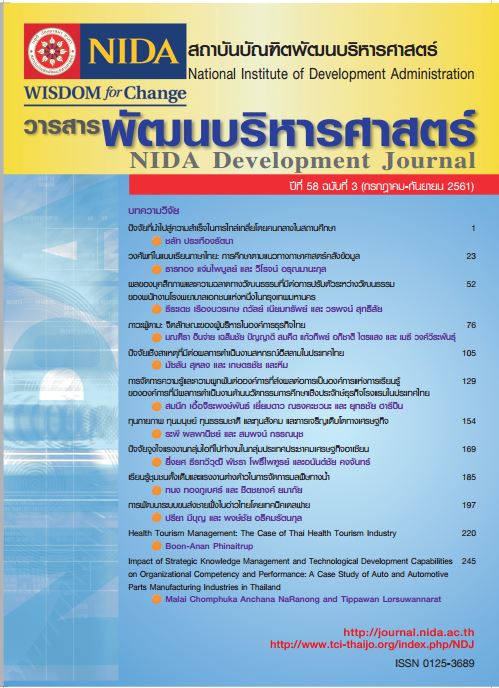Outward Migration to ASEAN Economic Community: A Study of Thai IT Professionals
Keywords:
IT professionals, Motivation, ASEAN economic community, Thailand, Workforce mobilityAbstract
This research explores the extent to which Thai IT professionals are interested to work in the member states of ASEAN economic community (AEC) and factors influencing them to work in these countries. Our sample is Thai IT professionals in private organizations and we use non-probability sampling techniques to attain 453 respondents participating in our online survey. Results show that Thai IT professionals have moderate to high interest to work in AEC. Self-efficacy in working abroad and career growth expectation are the two key factors influencing Thai IT professionals’ interest to work in ASEAN countries. In contrast, English language proficiency, marital status and family influence are not significantly associated with Thai IT professionals’ interest to work in these countries. This suggests that Thai IT professionals especially those who have high self-efficacy in working abroad and expect career growth opportunity would be interested to work in the member states of AEC once a free flow of workforce mobility is made possible. Therefore, management should apply career development opportunity as the means to attract and retain IT professionals.
References
กลุ่มสถิติแรงงาน, สำนักงานสถิติแห่งชาติ. (2554). สรุปผลที่สำคัญผู้ทำงานด้านเทคโนโลยีสารสนเทศและการสื่อสาร พ.ศ. 2554. สืบค้นวันที่ 8 มิถุนายน 2557 จาก สำนักงานสถิติแห่งชาติ: http://service.nso.go.th/nso/nsopublish/themes/files/ictwkRep54.pdf
Adler, N. J. (1986). Do MBAs want international careers? International Journal of Intercultural Relations, 10, 277-300.
Aryee, S., Chay, Y. W., & Chew, J. (1996). An investigation of the willingness of managerial employees to accept an expatriate assignment. Journal of Organizational Behavior, 17(3), 267-283.
Bandura, A. (1986). Social foundations of thought and action: a social cognitive theory. Englewood Cliffs, NC: Prentice-Hall.
Bandura, A. (1997). Self-efficacy. New York: W. H. Freeman.
Bandura, A. (2002). Social cognitive theory in cultural context. Applied Psychology: An International Review, 51(2), 269–290.
Brett, J. M., & Stroh, L. K. (1995). Willingness to Relocate Internationally. Human Resource Management, 34(3), 405-424.
Byars-Winston, A., Estrada, Y., Howard, C., Davis, D., & Zalapa, J. (2010). Influence of Social Cognitive and Ethnic Variables on Academic Goals of Underrepresented Students in Science and Engineering: A Multiple-Groups Analysis. J Couns Psychol, 57(2), 205–218.
Doherty, N., & Dickmann, M. (2013). Self-Initiated Expatriation: Drivers, Employment Experience, and Career Outcomes. In M. Andresen, A. Al Ariss, & M. Walther, Self-Initiated Expatriation: Individual, Organizational and National Perspectives, eds (pp. 122-142). New York/London: Routledge.
Johnson, J. P., Lenartowicz, T., & Apud, S. (2006). Cross-Cultural Competence in International Business: Toward a Definition and a Model. Journal of International Business Studies, 37(4), 525-543.
Konopaske, R., Robie, C. & Ivancevich, J. M. (2005). A preliminary model of spouse influence on managerial global assignment willingness, The International Journal of Human Resource Management, 16:3, 405-426, DOI:
10.1080/0958519042000339570
Lent, R. W., Brown, S. D., & Hackett, G. (1994). Toward a Unifying Social Cognitive Theory of Career and Academic Interest, Choice, and Performance [Monograph]. Journal of Vocational Behavior, 45, 79-122.
Lent, R. W., Brown, S. D., & Hackett, G. (2000). Contextual Supports and Barriers to Career Choice: A Social Cognitive Analysis. Journal of Counseling Psychology, 47, 36-49.
Lent, R. W. (2005). A social cognitive view of career development and counseling. In S. D. Brown & R. W. Lent (Eds.), Career development and counseling: Putting theory and research to work (pp.101-127). New York: John Wiley.
Lent, R. W., Singley, D., Sheu, H., Gainor, K. A., Brenner, B. R., Treistman, D., et al. (2005). Social-cognitive predictors of domain and life satisfaction: Exploring the theoretical precursors of subjective well-being. Journal of Counseling Psychology, 52, 429–442.
Lent, R. W., & Brown, S. D. (2006). On Conceptualizing and Assessing Social Cognitive Constructs in Career Research: A Measurement Guide. Journal of Career Assessment, 14(1), 12-35.
Lent, R. W., & Brown, S. D. (2013). Social cognitive model of career self-management: Toward a unifying view of adaptive career behavior across the life span. Journal of Counseling Psychology, 60(4), 557-568. doi:10.1037/a0033446
Lent, R. W., Lopez Jr., A. M., Lopez, F. G., & Sheu, H.-B. (2008). Social cognitive career theory and the prediction of interests and choice goals in the computing disciplines. Journal of Vocational Behavior, 73, 52–62.
Manning, C., & Sidorenko, A. (2007). The regulation of professional migration: Insights from the health and IT sectors in ASEAN. The World Economy, 30(7), 1084-1113.
ManpowerGroup. (2013). Talent Shortage Survey Research Results 2013. Retrieved April 29, 2014, from http://goo.gl/rtoIbI.
PwC. (2014). Fit for the future 17th Annual Global CEO Survey Key findings in the technology industry. Retrieved April 29, 2014, from http://goo.gl/9DDxEy.
Remhof, S., Gunkel, M., & Schlagel, C. (2013). Working in the “Global Village”: The Influence of Cultural Intelligence on the Intention to Work Abroad. German Journal of Research in Human, 27(3), 224-250.
Sheu, H.-B., Lent, R. W., Brown, S. D., Miller, M. J., Hennessy, K. D., & Duffy, R. D. (2010). Testing the choice model of social cognitive career theory across Holland themes: A meta-analytic path analysis. Journal of Vocational Behavior, 76, 252–264.
Singh, R., Fouad, N. A., Fitzpatrick, M. E., Liu, J. P., Cappaert, K. J., & Figuereido, C. (2013). Stemming the tide: Predicting women engineers' intentions to leave. Journal of Vocational Behavior, 83, 281–294.
Tharenou, P. (2003). The initial development of receptivity to working abroad: Self-initiated international work. Journal of Occupational and Organizational Psychology, 76, 489-515.
Vroom, V. H. (1964). Work and motivation. New York: Wiley.
Downloads
Published
How to Cite
Issue
Section
License

This work is licensed under a Creative Commons Attribution-NonCommercial-NoDerivatives 4.0 International License.





